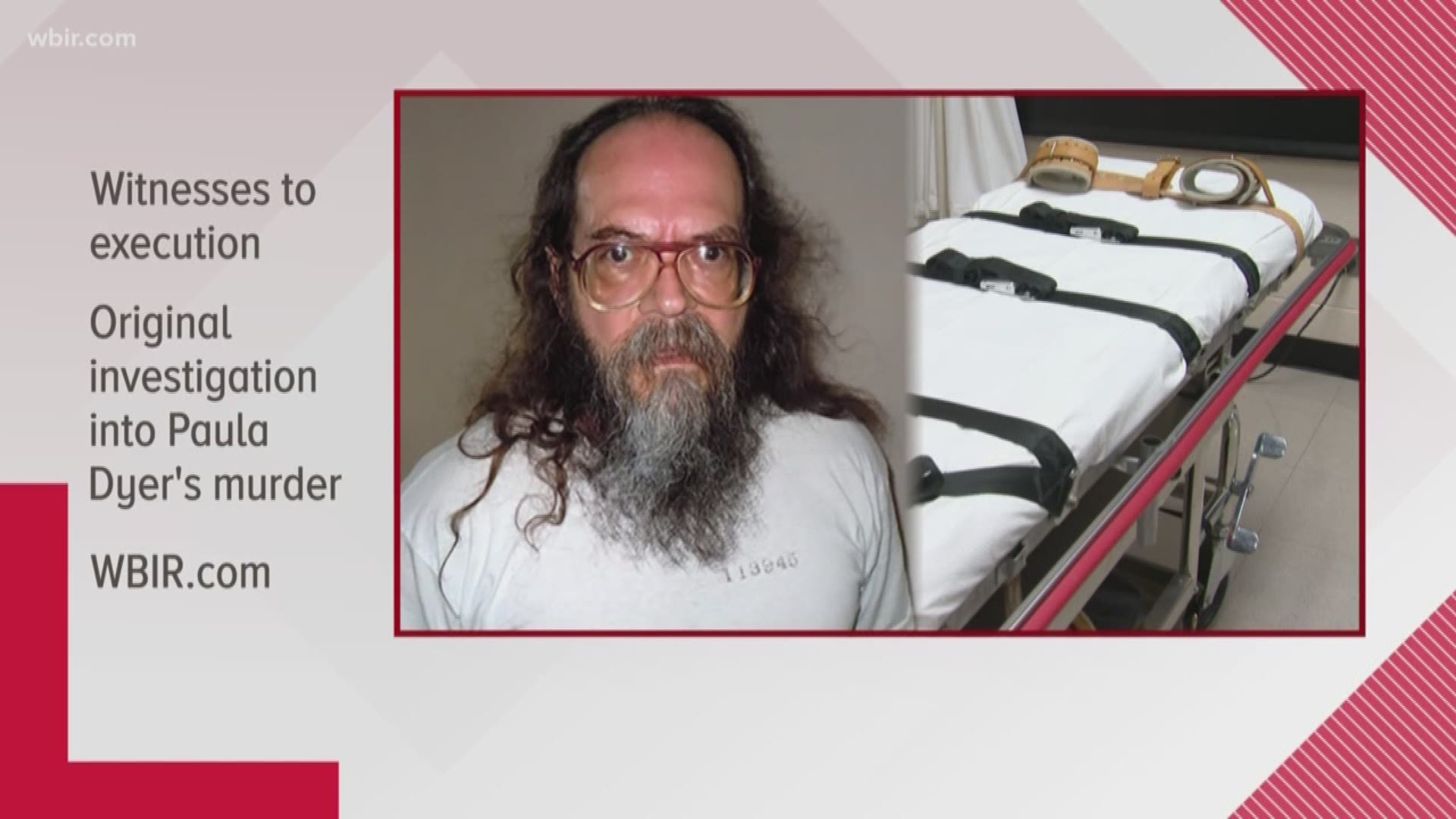KNOXVILLE, Tenn. — The East Tennessee man convicted of raping and murdering 7-year-old Paula Dyer in 1985 is dead.
Billy Ray Irick was executed by means of lethal injection the night of Aug. 9. His official time of death was 8:48 p.m. EDT. The sentence was carried out at the Riverbend Maximum Security Institution in Nashville.
Dyer's family left the institution in a van shortly after the execution was finished and did not make any statements.
Tennessee Attorney General Herbert Slatery III released a statement after Irick's execution:
“The death penalty is constitutional and it is the law of the State of Tennessee. It has taken decades and multiple court hearings, but justice was finally served for the murder and aggravated rape of 7-year-old Paula Dyer," he said. "Justice was delayed too long for this little girl and her family. I hope tonight’s lawful execution in some way eases the heartache Paula’s family has lived with and brings a degree of closure to a chapter of their lives that has been indescribably difficult.”
Witnesses speaking at the news conference said they were taken into the chamber around 7:42 p.m. and the curtains to view the execution came up at approximately 8:26 p.m.
Irick was reportedly hooked up to IVs and strapped down.
When asked if he had any last words, Irick said "no" at first and paused, but shortly after said "I just want to say I'm really sorry. And that... that's it."
The lethal injection process was carried out around 8:28 p.m.
After the first of three drugs was administered, witnesses said Irick's eyes closed minutes later and he began rhythmically snoring. The drug was midazolam -- which was intended to render Irick unconscious.
The executioner then injected vecuronium bromide and potassium chloride to stop Irick's heart and lungs.
Witnesses said Irick looked like he was struggling to breath around 8:34 p.m. and sounded like he was gasping before he became unresponsive three minutes later. It was at that time witnesses said they observed the warden shouting "Billy" a couple of times to perform a consciousness check, which one witness said the shouts will stick with him for a long time.
At 8:46 p.m., the curtains were closed and officials pronounced Irick dead two minutes later.
Witnesses said they were unsure if Irick felt any pain in the time following the injections before he died. Some said it appeared Irick looked to have had essentially fallen asleep before he stopped breathing.
Dave Boucher with The Nashville Tennessean said one of Irick's attorneys, Gene Shiles, witnessed the execution and gave him a statement in the waiting room.
"I never thought for one moment that it would come to this." Shiles said. "I never did."
WBIR 10News Senior Reporter John North was one of the media witnesses. He said he also spoke with Shiles, saying the attorney was optimistic on his client's behalf until around 2:30 p.m. when the U.S. Supreme Court announced it would not intervene.
According to the Tennessean, before the execution began Shiles and Deputy Attorney General Scott Sutherland left the viewing room at 8:12 p.m., presumably to go into the execution chamber and observe Irick's IV being administered.
When the two men returned into the observation room around 8:25 p.m. Boucher said Shiles told witnesses that he kissed Irick and touched him.
Some witnesses said the execution was surreal to watch.
REMEMBERING WHY: 1985 rape and murder of 7-year-old Paula Dyer
Dyer's family was among media and others witnessing the execution.
WBIR had a journalist present to witness the execution, as did the Knoxville News Sentinel and several other Tennessee media organizations.
Witnesses apply and are picked by a drawing process conducted by the state Department of Correction.
An attorney for Irick and an attorney for the state Attorney General's Office also were in attendance, according to TDOC.
At around 4:00 p.m., Irick ate his last meal of a deluxe burger, onion rings and a Pepsi. According to North, Shiles told him earlier that Irick was in good spirits and understood he was going to be executed.
Tennessee's last execution was in December 2009, and the last time an East Tennessee man had been put to death was in 1960.
According to Knox County District Attorney General Charme Allen, some of the delay in carrying out Irick's death sentence was by design -- as seeking the death penalty means special protocol.
"He is then entitled to a long appellate process like you've seen in this case, it's taken 33 years to get through that appellate process," she said.
Courts also had to rule whether the execution drugs would cause too much pain, which a Nashville judge ruled Tennessee could move forward with executions using the 3-drug injection method.
Editor's Note: All times listed in this article are in Eastern Daylight Time. Irick was executed in Nashville, which means official times reported by authorities and witnesses were done so in Central Daylight Time.

